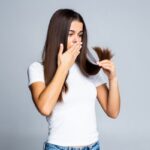Your hair is a reflection of your overall health and well-being. While genetics play a significant role in determining your hair type, texture, and growth, external and internal factors can greatly influence its health. Understanding these factors is essential to maintaining luscious, healthy locks. In this article, we’ll explore the various elements that can affect your hair health, including one often-overlooked aspect: your scalp condition.
-
Nutrition and Diet
What you eat has a direct impact on the health of your hair. Hair is primarily made of keratin, a protein, which means your diet should include sufficient protein-rich foods like eggs, lean meats, nuts, and legumes. Other essential nutrients include:
- Iron: Prevents hair thinning and shedding.
- Zinc: Supports scalp health and oil gland function.
- Vitamins A, C, D, and E: Promote growth and prevent dryness.
- Omega-3 Fatty Acids: Nourish hair follicles and add shine.
A deficiency in any of these nutrients can lead to dull, brittle, or thinning hair.
-
Stress
Chronic stress can lead to hair problems like thinning, hair fall, or conditions such as telogen effluvium, where hair prematurely enters the shedding phase. Stress affects the body’s ability to absorb nutrients, disrupts hormonal balance, and impairs the hair growth cycle. Engaging in stress-relief practices such as yoga, meditation, or regular exercise can significantly improve hair health.
- Medications and Health Conditions
Certain medications, such as chemotherapy drugs, blood thinners, or antidepressants, can cause hair loss as a side effect. Additionally, health conditions like alopecia, lupus, or anemia can impact hair growth and quality. If you suspect a medical condition or medication is affecting your hair, consult a healthcare professional for guidance.
-
Scalp Condition
A healthy scalp is the foundation of healthy hair. If your scalp is not in good condition, it can directly affect hair growth and quality. Common scalp issues include:
- Dandruff: Caused by an overgrowth of yeast, leading to flakes and itchiness.
- Dry Scalp: Results in irritation, flaking, and lack of hydration for hair follicles.
- Oily Scalp: Excess sebum can clog follicles, leading to weaker hair.
- Scalp Infections: Conditions like psoriasis or fungal infections can disrupt hair growth.
Maintaining scalp health involves regular cleansing, proper exfoliation, and using scalp soothing shampoo suited for your scalp type. Ingredients like tea tree oil, salicylic acid, and aloe vera can help improve scalp health.
-
Environmental Factors
Exposure to harsh environmental elements can damage hair. Common culprits include:
- Sunlight: UV rays can weaken hair strands, cause dryness, and fade color.
- Pollution: Dirt and toxins in the air can accumulate on your scalp, clogging follicles and causing hair to become dull and brittle.
- Hard Water: High levels of calcium and magnesium in hard water can leave residue on hair, making it rough and prone to breakage.
Protecting your hair with hats, scarves, and products containing UV filters can minimize damage from the environment.
-
Heat Styling and Chemical Treatments
Excessive use of heat styling tools like curling irons, straighteners, and blow dryers can strip your hair of natural moisture, leading to dryness and split ends. Similarly, chemical treatments such as coloring, bleaching, and perming can weaken the hair structure and cause breakage.
- Tip: Use heat protectant sprays and opt for lower-heat settings. Limit chemical treatments to avoid compromising your hair’s integrity.
-
Hydration Levels
Just like your skin, your hair needs hydration. Dehydration can cause dryness and brittleness, making hair more prone to damage. Drinking adequate water and using moisturizing products can help restore hydration to your hair. Look for ingredients like glycerin, hyaluronic acid, and coconut oil in your haircare routine to lock in moisture.
-
Age
As you age, your hair goes through several changes. Hair growth slows down, and individual strands may become finer. The scalp produces less oil, which can result in dryness and dullness. While you can’t stop aging, you can slow its effects by adopting a healthy haircare routine and using age-specific products designed to boost volume and hydration.
-
Improper Haircare Practices
Your daily haircare routine can make or break your hair health. Common mistakes include:
- Using shampoos with harsh sulfates that strip natural oils.
- Over-washing hair, which leads to dryness.
- Under-washing, which allows product and oil buildup.
- Rough towel drying, which causes breakage.
Switch to gentle, sulfate-free shampoos, condition regularly, and use a microfiber towel to minimize damage.
-
Genetics
Your genetics play a significant role in determining your hair type, texture, and growth patterns. If your family has a history of hair thinning or balding, you may be more prone to similar issues. While you can’t change your genetics, a tailored haircare routine and preventive measures, like using growth-stimulating products, can help mitigate the effects.
Conclusion
Healthy hair is the result of a combination of good nutrition, proper haircare practices, and addressing environmental and internal factors. While some aspects, such as genetics, are beyond your control, many others can be managed effectively with the right approach. By paying attention to your scalp condition, diet, and daily haircare routine, you can maintain beautiful, frizz-free, and resilient hair for years to come.

